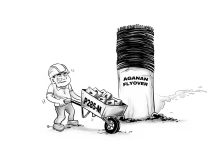
URBAN planning is not a guessing game. It is the backbone of building a livable, resilient city. Yet in Iloilo, that backbone is repeatedly broken — not by lack of plans, but by national agencies that plow ahead as if local priorities don’t matter. The Department of Public Works and Highways (DPWH), in particular, has turned coordination into an afterthought, leaving the city to clean up the mess.
We’ve seen it all before. Roads freshly paved, only to be ripped open months later for drainage. Sidewalks rendered useless because of poorly placed utilities. Flood-prone zones left to drown because the so-called “solutions” weren’t aligned with the city’s flood-control blueprint. These are not innocent mistakes. They are the inevitable consequence of arrogance — of agencies refusing to listen, consult, or respect the city’s development vision.
The price is staggering. Taxpayers end up paying twice, sometimes thrice, for the same patch of road or drainage. Commuters lose hours stuck in traffic caused by botched sequencing of projects. Families wade through flooded streets because national projects failed to link with local plans. This is not progress. This is chaos, funded by the people’s money.
The proposal to require national agencies to first secure a Certificate of Coordination from the city before rolling out projects is, therefore, a commonsense safeguard. Coordination is smart governance. It ensures that scarce public funds are spent on complementary initiatives that reinforce each other rather than cancel each other out.
The larger point here is that development cannot be pursued piecemeal. Cities like Iloilo have comprehensive plans designed to anticipate growth, manage risks, and enhance quality of life. National projects that ignore these plans may boast ribbon cuttings today but will leave headaches tomorrow.
Urban planning demands discipline, foresight, and above all, respect for the city’s development blueprint. Iloilo has worked hard to become one of the country’s most livable urban centers. Such is being undermined each time DPWH and other national offices act like they own the city’s streets and waterways. Enough of this duplication and dysfunction. Coordination must not be optional—it must be the rule.
Poor coordination is costly. Not just in pesos, but in lost opportunities and compromised livability.







